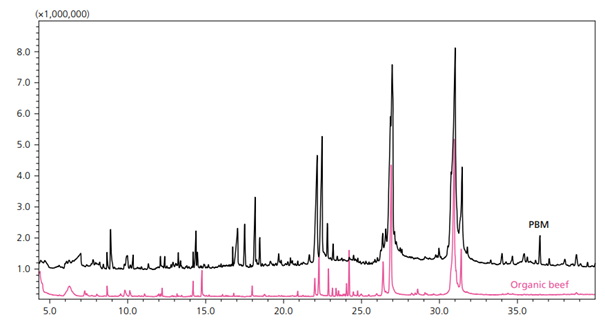Panel discussion on...
Cognitive health
Welcome in the world of alternative meat: analytical challenges and perspectives
What are the latest global and regional trends in cognitive health supplements, and how do companies tailor their products to meet the unique needs of different markets?
The cognitive health supplement market is experiencing a significant shift with companies launching products that specifically target mental wellness (1) and enhance concentration levels. Meanwhile, many consumers, especially older people, are seeking supplements to address nutritional needs and overall well-being. Products containing natural ingredients continue to attract consumer attention (2), while more diverse product formats, such as chewables and powder supplements, are becoming increasingly popular (2, 4).
Companies are reacting by tailoring their products according to each major region. For example, in North America, companies are responding to the strong demand for cognitive health supplements that support mental wellness, (3) while the European market is seeing companies develop supplements that focus on specific cognitive functions, such as concentration or memory (1). In the Asia-Pacific region, companies are reacting to consumers gravitating towards holistic health solutions (2).
What are the most promising breakthroughs in cognitive health and/or supplements over the past year, and how are they influencing product development?
The pandemic had a huge impact not only on body organs but also on mental well-being. In this connection, among the Top 10 health concerns affecting consumers in the past year were mental health concerns such as anxiety, depression, and mood changes (5). This has seen an increased demand for supplements addressing these concerns, but it is the supplements addressing reduced energy levels, joint health, and skin health that remain the most popular and continue to strongly influence product development for companies.
How has the consumer understanding of brain health evolved recently, and what role do branded ingredients play in shaping their trust and preferences?
During the pandemic, the topic of mental health was more openly addressed in the public domain and, as a consequence, brain health has also experienced an increase in awareness among consumers. A more intense focus in the media on illnesses such as dementia has also helped consumers better understand the importance of brain health.
Branded ingredients are increasingly important to consumers. In November 2024, 88% of consumers stated branded ingredients were very influential in their choice of supplement, which is a significant increase from 65% in April 2020 (6). Meanwhile, 79% of consumers expressed a willingness to pay a premium for supplements with branded ingredients (7). Furthermore, certifications for sustainably sourced ingredients such as fish or grass-fed collagen build trust in a brand.
Are there specific cognitive functions, such as memory, focus, or stress management, that are driving the majority of consumer interest? Why?
For consumers, “brain health” includes optimizing cognition, preventing the decline of mental faculties, and a more holistic approach that features additional benefits such as improved sleep, more energy, and reduced stress levels (8). Consequently, different generations have different priorities regarding cognitive health. For example, cognitive decline is a significant concern for older consumers (9).
With the concept of holistic health attracting more interest, the correlation between mental well-being and brain health has become increasingly clearer to consumers. Studies have indicated that a high level of psychological well-being is strongly associated with better cognitive function in middle-aged and older adults.
What advancements in ingredient delivery systems are being made to enhance the bioavailability of cognitive health supplements?
Several advances in ingredient delivery systems are being made to improve the bioavailability of ingredients. In relation to collagen, one of the most important developments is the controlled production process and special hydrolysis techniques for rapid absorption and high bioavailability. Hydrolysis breaks down proteins, such as collagen, into smaller bioactive peptides or amino acids, which can significantly increase their bioavailability and bioactivity. Other notable methods include encapsulation techniques (encapsulating bioactive compounds in materials such as peptides to protect them from degradation and improve their bioavailability), lipid-based delivery systems (incorporating health ingredients into liposomes, micelles or lipid particles to improve absorption), nanotechnology (using nanoparticles to improve the solubility and stability of health ingredients, making them easier for the body to absorb), and the use of bioenhancers or gut health enhancers (adding substances or improving gut health that can enhance the absorption of ingredients) (10, 11, 12, 13).
What role does sustainability play in the cognitive health space, particularly in sourcing and manufacturing ingredients?
A significant percentage of global consumers have expressed either an occasional or frequent inclination to purchase products featuring sustainable ingredients (5). Regarding cognitive health, the consumer preference for sustainability has further enhanced collagen as a highly relevant ingredient because it upcycles by-products from the meat and fish industries, resulting in the production of natural ingredients with added value. Furthermore, consumers and companies have expressed a favorable attitude toward collagen that is sustainably sourced and certified as either fish or grass-fed. Ensuring animal welfare is a major area of importance for consumers, and grass-fed collagen is often regarded as being of higher quality.
Which emerging ingredients show the most potential for supporting cognitive health, and how are they being clinically validated?
While collagen is not a new ingredient it is a potentially very significant ingredient for both mental and cognitive well-being. Despite being in the early stages of research, new findings have suggested that collagen peptides could have untapped potential for mental well-being and be linked to long-term cognitive health. These findings are being clinically validated by randomized controlled double-blind studies (15, 16, 17).
Are there regional variations in consumer priorities for cognitive health supplements, such as stress relief in Asia versus memory enhancement in Western markets? How are these differences addressed in product development and marketing?
There are clear regional variations, as indicated above. In North America, demand is focused on cognitive health supplements supporting mental wellness, (3) while European demand is based around supplements that focus on specific cognitive functions, such as concentration or memory (1). In the Asia-Pacific region, consumers are demanding holistic health solutions (2). Companies producing cognitive health supplements must continue to monitor global market trends and tailor product development accordingly.
What innovative approaches are being used to educate consumers about the science behind cognitive health supplements?
Innovative approaches explaining the science behind cognitive health supplements often start with educating the brands themselves. To ensure that the information communicated to consumers is accurate and credible, expert centers have been created for specialists to share their knowledge with brand representatives. Additional means of educating consumers include the publication of clinical studies and webinars or online training sessions for brand representatives and end consumers alike.
Do you see a shift towards multi-benefit supplements that combine cognitive support with other health areas, such as mood, energy, emotional well-being or immune function?
We are seeing such a shift and this is supported by a growing body of scientific evidence and consumer demand for comprehensive health solutions.
Since 2022, there has been a trend of combining claims connecting brain/mood health with other claims. For example, collagen peptides have been extensively studied and shown to provide several health benefits, particularly for the aging population. Research suggests collagen supplementation can significantly reduce joint pain, thereby improving one’s ability to perform daily activities with greater comfort and ease (15, 16, 17). These findings suggest that collagen is an ideal supplement for individuals seeking to maintain both physical and mental well-being as they age (18, 19, 20).
Where do you see the cognitive health supplement market in the next 5 to 10 years, and what trends or innovations do you anticipate will define its future?
This market will continue to grow in the next 5-10 years. Consumers – young and old – are increasingly focusing on cognitive well-being (21, 9). This rising awareness and demand is likely to result in more innovative product offerings in the future (21, 9). We anticipate AI and data analytics will play a greater role in product development, (1, 22) while distribution channels will also expand (9). Such growth will most likely be accompanied by the need to ensure transparency, quality assurance, and solid scientific research (23).

Figure 1. Overlaid Representative Chromatograms for PBM (black) and Organic Beef (pink) (6).
Panelists
References and notes
- Industry Insights: Top Trends in Health and Beauty 2024 (GlobalData);
- Opportunities in the Global Vitamins and Dietary Supplements Sector 2024 (GlobalData);
- Trending Ingredients across the FMCG Space (GlobalData);
- Nutritional Supplements Survey November 2024 – NS543 (FMCG Gurus).
- ITC Insights 2024 Consumer Insights on Collagen Users
- FMCG Gurus Nutritional Supplements Survey, NS745.
- FMCG Gurus Dietary Supplements Survey, NS478.
- Young HA, Cousins AL, Byrd-Bredbenner C, Benton D, Gershon RC, Ghirardelli A, Latulippe ME, Scholey A, Wagstaff L. Alignment of Consumers' Expected Brain Benefits from Food and Supplements with Measurable Cognitive Performance Tests. Nutrients. 2024 Jun 19;16(12):1950. doi: 10.3390/nu16121950. PMID: 38931303; PMCID: PMC11206270.
- Industry Insights: Category Innovation Opportunities with Nootropics (GlobalData).
- Ugwu Okechukwu Paul-Chima, Chinyere Nneoma Ugwu, Esther Ugo Alum. Integrated approaches in nutraceutical delivery systems: optimizing ADME dynamics for enhanced therapeutic potency and clinical impact. RPS Pharmacy and Pharmacology Reports. 2024, 3 (4) rqae024. https://doi.org/10.1093/rpsppr/rqae024https://academic.oup.com/rpsppr/article/3/4/rqae024/7814829;
- New Roger. Oral Delivery of Biologics via the Intestine. Pharmaceutics. 2020;13(1). https://doi.org/10.3390/pharmaceutics13010018https://www.ncbi.nlm.nih.gov/pubmed/33374222;
- Skov Kathrine, Oxfeldt Mikkel, Thogersen Rebekka, Hansen Mette, Bertram Hanne Christine. Enzymatic Hydrolysis of a Collagen Hydrolysate Enhances Postprandial Absorption Rate-A Randomized Controlled Trial. Nutrients. 2019;11(5).https://doi.org/10.3390/nu11051064 - https://www.ncbi.nlm.nih.gov/pubmed/31086034;
- Yuwen Ting, Yike Jiang, , Chi-Tang Ho, Qingrong Huang. Common delivery systems for enhancing in vivo bioavailability and biological efficacy of nutraceuticals. Journal of Functional Foods. 2014 (7) 112-128.https://doi.org/10.1016/j.jff.2013.12.010https://www.sciencedirect.com/science/article/abs/pii/S1756464613003046.
- ITC Insights 2024 Consumer Insights on Collagen Users
- Kviatkovsky, S. A., Hickner, R. C., Cabre, H. E., Small, S. D., & Ormsbee, M. J. (2023). Collagen peptides supplementation improves function, pain, and physical and mental outcomes in active adults. J Int Soc Sports Nutr, 20(1), 690-707. https://doi.org/10.1080/15502783.2023.2243252 - https://www.tandfonline.com/doi/full/10.1080/15502783.2023.2187955;
- Kviatkovsky, S. A., Hickner, R. C., Gipson, S. D., Cabre, H. E., Hanna, B. R., Colannino, H. G., O’Connor, K. E., Haywardf, A. S., & Ormsbee, M. J. (2023). Collagen Peptide Supplementation Improves Mental Component Scores of the VR-12 in Active Adults. Journal of the International Society of Sports Nutrition, 20, 49-50. https://www.tandfonline.com/doi/full/10.1080/15502783.2023.218795 - https://www.ncbi.nlm.nih.gov/pubmed/37551682;
- Kviatkovsky, S. A., Hickner, R. C., & Ormsbee, M. J. (2022). Collagen peptide supplementation for pain and function: is it effective?. Curr Opin Clin Nutr Metab Care, 25(6), 401-406. https://doi.org/10.1097/MCO.0000000000000870https://www.ncbi.nlm.nih.gov/pubmed/36044324.
- Kviatkovsky SA, Renteria LI, Hickner RC, Small SD, Cabre HE, Colannino HG, et al. Effects Of Collagen Peptide Supplementation On Biomarkers Of Connective Tissue Turnover: CTX/P1NP Ratio. Medicine & Science in Sports & Exercise. 2023;55:861.https://doi.org/10.1249/01.mss.0000987940.40829.04https://journals.lww.com/acsmmsse/fulltext/2023/09001/effects_of_collagen_peptide_supplementation_on.2061.aspx
- Kviatkovsky SA, Hickner RC, Gipson SD, Cabre HE, Hanna BR, Colannino HG, et al. Peptide Supplementation Improves Measures of Activities of Daily Living and Pain in Active Adults. Journal of the International Society of Sports Nutrition. 2022;19 35-6. https://doi.org/10.1080/15502783.2022.2056381https://www.tandfonline.com/doi/full/10.1080/15502783.2022.2056381;
- Holwerda AM, van Loon LJC. The impact of collagen protein ingestion on musculoskeletal connective tissue remodeling: a narrative review. Nutr Rev. 2022;80(6):1497-514.https://doi.org/10.1093/nutrit/nuab083https://www.ncbi.nlm.nih.gov/pubmed/34605901
- Sector Forecast: Consumer Health” (GlobalData)
- TrendSights Analysis 2023: Guided Health” (GlobalData);
- Opportunities in the Global Vitamins and Dietary Supplements Sector 2024” (GlobalData)


































